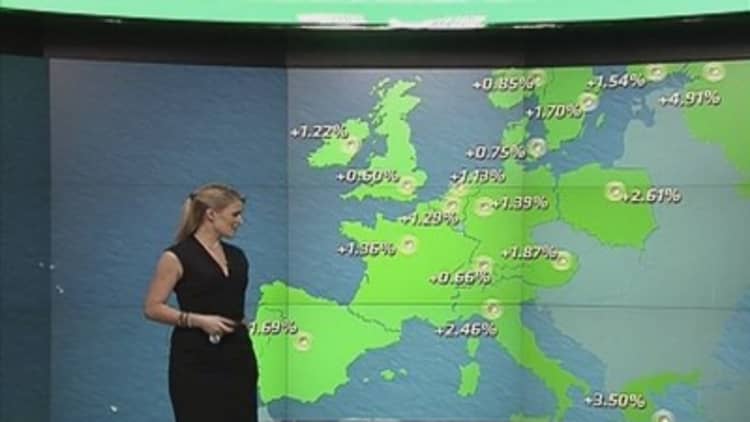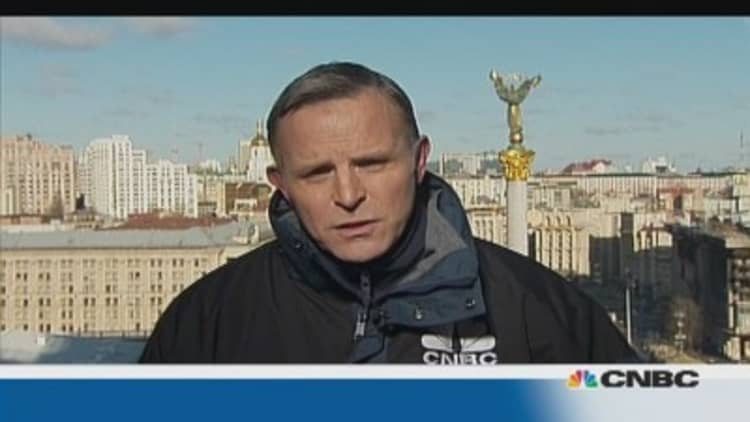
European stocks closed higher on Monday - recovering from last week's slump - as investors responded to positive U.S. data and shrugged off the referendum result in Crimea at the weekend.
Sanctions on Russia eyed
The pan-European FTSEurofirst 300 Index provisionally closed higher by 1 percent at 1,297.71 points after witnessing declines of over 3 percent last week ahead of the referendum in Crimea.
However, investors started the week by brushing off the result as the voting passed without violence and after data showed U.S. manufacturing output jumped the most in six months in February.
U.S. stocks climbed on Monday, with the Dow Jones Industrial Average bouncing back from a five-session losing streak. U.S. industrial production rose 0.6 percent last month, better than the 0.2 percent rise anticipated by economists polled by Reuters.
Back in Europe, Russian news outlets reported on Sunday that 95.5 percent of Crimeans voted to break away from Ukraine and join the Russian Federation. Russia's lower house of parliament stated that it will pass legislation allowing Crimea to join the nation in the "very near future," while Crimea's government officially asked Russia to annex the region on Monday.
With the result of the referendum widely seen as a foregone conclusion, markets remained sanguine on Monday, with a late afternoon boost following the U.S. data release.
(Read our live blog: Latest developments in Crimea crisis)
However, both the European Union and the U.S were quick to criticize the vote as against international and Ukrainian law, and announced the beginning of a series of sanctions that could spook the market looking ahead.
U.S. President Barack Obama announced sanctions on 11 Russians and Ukrainians blamed for Russia's military incursion into Crimea. The European Union will also impose travel bans and asset freezes of 21 Russian and Ukrainian officials.
White House officials also warned more sanctions would follow if Russia proceeds with the formal annexation of Crimea.
Putin is scheduled to deliver a speech on Tuesday.
(Read more: Vote over, now what between West and Russia?)
"The absence of a diplomatic solution to prevent an escalation of events in Ukraine following the weekend's referendum in Crimea suggests that geopolitics will continue to cloud the outlook," Chris Scicluna, an economist at Daiwa Capital, said in a note.
European markets
Meanwhile, events in China continued to be monitored amid lingering concerns over the health of the world's second-largest economy.
China's central bank eased its grip on its currency over the weekend by doubling the yuan's daily trading band to 2 percent. The currency will now be allowed to trade two percent above or below a midpoint fixed daily by the central bank. The yuan traded lower on Monday and most analysts expect it to depreciate further.
(Read more: The yuan trading band has been widened - now what?)
UK homebuilders soar
In corporate news, shares of heavily-weighted climbed 1.7 percent on the FTSE 100 after the company announced it had agreed to buy Spain's largest cable operator Ono for 7.2 billion euros ($10 billion).

In other stocks news, shares closed down 2.6 percent after the German industrial gases maker said its fourth quarter earnings were weighed upon by the strength of the single currency. Meanwhile, Swiss asset management firm saw its shares slip 1.6 percent after RBC cut its outlook on the stock to "underperform".
In the U.K., the government's decision to extend its housing stimulus scheme helped homebuilders on the . Shares of provisionally closed higher by 3.7 percent, saw gains of 2 percent and Barratt Developments climbed 3 percent.
On the data front, a final reading for February euro zone inflation showed that consumer prices rose at their slowest pace since November 2009. The figure dipped back down to 0.7 percent (year-on-year) in February, according to the revised data, hitting the same rate that triggered a surprise interest rate cut by the European Central Bank in November.
Follow us on Twitter: @CNBCWorld

